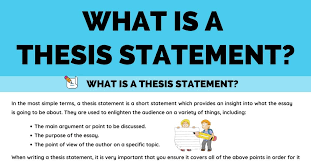Your thesis is more than a general sentence about your main idea. It needs to establish a clear position you will support with balanced proofs (logos, pathos, ethos). Use the checklist below to help you create a thesis.
This section is adapted from Writing with a Thesis: A Rhetoric Reader by David Skwire and Sarah Skwire:
Make sure you avoid the following when creating your thesis:
- A thesis is not a title: Homes and schools (title) vs. Parents ought to participate more in the education of their children (good thesis).
- A thesis is not an announcement of the subject: My subject is the incompetence of the Supreme Court vs. The Supreme Court made a mistake when it ruled in favor of George W. Bush in the 2000 election.
- A thesis is not a statement of absolute fact: Jane Austen is the author of Pride and Prejudice.
- A thesis is not the whole essay: A thesis is your main idea/claim/refutation/problem-solution expressed in a single sentence or a combination of sentences.
- Please note that according to the MLA Handbook for Writers of Research Papers, Seventh Edition, "A thesis statement is a single sentence that formulates both your topic and your point of view" (Gibaldi 42). However, if your paper is more complex and requires a thesis statement, your thesis may require a combination of sentences.
Make sure you follow these guidelines when creating your thesis:
- A good thesis is unified:
- NOT: Detective stories are not a high form of literature, but people have always been fascinated by them, and many fine writers have experimented with them
(floppy). vs.
-
- BETTER: Detective stories appeal to the basic human desire for thrills (concise).
- A good thesis is specific:
- NOT: James Joyce’s Ulysses is very good. vs.
- BETTER: James Joyce’s Ulysses helped create a new way for writers to deal with the unconscious.
- Try to be as specific as possible (without providing too much detail) when creating your thesis:
- NOT: James Joyce’s Ulysses helped create a new way for writers to deal with the unconscious. vs.
- BETTER: James Joyce’s Ulysses helped create a new way for writers to deal with the unconscious by utilizing the findings of Freudian psychology and introducing the techniques of literary stream-of-consciousness.
Quick Checklist:
_____ The thesis/claim follows the guidelines outlined above
_____ The thesis/claim matches the requirements and goals of the assignment
_____ The thesis/claim is clear and easily recognizable
_____ The thesis/claim seems supportable by good reasoning/data, emotional appeal
 English
English Persian
Persian

